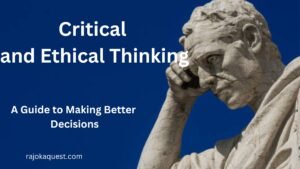Barriers to Critical Thinking
Barriers to Critical TTagshinking
Critical thinking is a skill that is universally recognized as indispensable; however, it is astonishing how frequently it is absent from our daily decision-making processes. The capacity to objectively analyze, evaluate, and synthesize information can significantly impact one’s personal life, school, or work, regardless of the context. However, what is it about critical thinking that presents such a challenge for so many individuals? The solution is to comprehend the barriers to critical thinking. These obstacles are akin to invisible boundaries that obstruct our ability to perceive the complete picture or to pose the appropriate inquiries. We should investigate these challenges and determine how they can be surmounted.
Definition of critical thinking
It is imperative to comprehend the definition of critical thinking before delving into the obstacles. Critical thinking is objectively scrutinizing and evaluating information to form a well-reasoned judgment. It involves examining assumptions, identifying biases, and distinguishing between fact and opinion. It entails examining a problem from various perspectives, considering various perspectives, and making decisions based on logic and evidence rather than sentiment or personal bias.
Significance of critical thinking
Critical thinking has never been more essential in today’s information-saturated world. We are continuously inundated with information from various sources, and not all of it is reliable or accurate. Critical thinking enables us to make informed decisions, differentiate between what is true and what is deceptive, and navigate through this vast ocean of information. It is a valuable skill for developing a well-rounded understanding of complex issues, decision-making, and problem-solving.
The Most Common Barriers to Critical Thinking
Now, we will explore the most prevalent obstacles to critical thinking. Acknowledging these obstacles is the initial step in overcoming them and improving our critical thinking skills.
1. Cognitive Biases
Cognitive biases are among the most formidable obstacles to critical reasoning. These are mental shortcuts that our minds employ to expedite information processing; however, they frequently result in errors of judgment. Cognitive fallacies that are commonly encountered include:
- Confirmation Bias: The inclination to seek, interpret, and retain information in a manner that supports our pre-existing beliefs.
- Anchoring Bias: The tendency to place an excessive amount of reliance on the initial piece of information that is encountered when making decisions.
- Hindsight Bias: The conviction that we had accurately predicted the outcome of an event after it had occurred.
These biases can obscure our discernment and induce us to make decisions based on incomplete or skewed information.
2. Emotional Barriers
Our cognitive processes are significantly influenced by emotions. Although emotions can offer valuable insights, they can also obscure our discernment and result in irrational decision-making. Fear, anger, affection, and pride can all impede our ability to think critically. For example, we may disregard any evidence that contradicts a particular idea or belief if we are emotionally attached to it.
3. Excessive dependence on authority
The overreliance on authority figures or experts is another obstacle. Although it is crucial to demonstrate respect for expertise, our thought processes may be impeded by blindly adhering to the advice of experts without critically scrutinizing or questioning the information. We must exercise our judgment, as even the most knowledgeable individuals may be mistaken.
4. Inadequate Knowledge or Information
A specific level of knowledge and information is necessary for critical thinking. It is challenging to conduct a critical analysis of a subject without sufficient information. This dearth of knowledge can result in the making of decisions based on assumptions or incomplete data, which can lead to poor outcomes.
5. Cultural and societal influences
Our beliefs, values, and cognitive processes are substantially influenced by our cultural and societal contexts. By encouraging conformity and discouraging the questioning of the status quo, these influences can serve as obstacles to critical thinking. For example, it may be difficult to think beyond the confines of cultural norms, as they may dictate specific behaviors or beliefs that are accepted without question.
6. Prejudice and Personal Bias
Personal biases and prejudices can significantly impede critical reasoning. These biases result from our upbringing, experiences, and environment and may result in a narrow-minded approach to decision-making and problem-solving. For instance, an individual who harbors animosity toward a specific demographic may fail to evaluate information that contradicts their preconceived notions regarding that demographic.
7. Groupthink
Groupthink is a phenomenon in which individuals adhere to a specific mode of thought to prevent conflict and preserve harmony. Although it may appear advantageous in fostering unity, it frequently results in suboptimal decision-making by suppressing critical evaluation and dissenting opinions. Individuals may experience pressure to conform to the majority opinion in such environments, although they have valid concerns or alternative ideas.
8. Time Limitations
In numerous circumstances, particularly in fast-paced environments such as the workplace, there is inadequate time to engage in critical thinking. In many cases, there is insufficient time to conduct a comprehensive analysis of the available information, contemplate alternatives, or consider the potential repercussions when decisions must be made promptly. This urgency may result in hastily made decisions that are not thoroughly considered.
9. Mental Laziness
Mental energy and effort are necessary for critical thought. It is significantly simpler to accept information at its face value than to investigate and challenge it. This mental sloth, or the inclination to circumvent the effort necessary for critical thinking, can be a significant impediment. People frequently favor the path of least resistance, which results in superficial reasoning and suboptimal decision-making.
10. Communication and Language Barriers
Critical thinking can also be impeded by language and communication barriers. Confusion and inaccurate interpretations may result from ambiguous language, misinterpretation, and a lack of straightforward communication. It is imperative to have effective and transparent communication in order to encourage critical thinking, particularly during discussions and debates.
Methods for Overcoming Barriers to Critical Thinking
Given that we have identified the obstacles, what strategies can we employ to surmount them? The following strategies can be implemented to improve critical thinking abilities:
1. Self-Reflection and Awareness
The initial step in surmounting obstacles to critical thinking is to recognize them. Self-reflection assists us in recognizing our emotional influences, biases, and potential flaws in our thinking. By acknowledging these obstacles, we can implement measures to alleviate their influence.
2. Pursue a Wide Range of Viewpoints
One method of addressing cognitive biases and groupthink is to search out a variety of viewpoints. Interacting with individuals with distinct perspectives and experiences can offer novel perspectives and challenge our preconceived notions. It broadens our comprehension and enables us to view issues from various perspectives.
3. Enhance Emotional Intelligence
Enhancing our emotional intelligence can assist us in regulating our emotions and preventing them from impairing our decision-making. More objective and rational decision-making can be achieved by being cognizant of our emotions and comprehending how they affect our thinking.
4. Encourage a Growth Mindset
A growth mindset entails the acceptance of challenges, the willingness to learn, and the recognition of failures as opportunities for personal development. This mentality motivates us to enhance our critical thinking abilities, solicit new information, and question our convictions.
5. Develop Effective Communication and Active Listening Skills
It is essential to enhance communication abilities in order to surmount language and communication barriers. Practice active listening by concentrating entirely on the speaker, asking clarifying questions, and summarizing the information you have heard. Clear and succinct communication is instrumental in the prevention of misunderstandings and the promotion of critical discourse.
6. Take your time
Before making any decisions, allocate sufficient time to conduct a comprehensive analysis of the information. Ensure that you do not hasten to draw conclusions and allow yourself the opportunity to consider critically. This may not always be possible in fast-paced environments; however, a brief pause to contemplate your options can significantly impact you.
7. Continue to acquire and broaden knowledge.
Critical thinking is a skill that can be cultivated over time. Continuously expanding one’s knowledge and learning provides the necessary instruments to engage in critical thinking regarding various topics. Engage with novel concepts, read extensively, and encourage yourself to evaluate alternative perspectives.
8. Assumptions in Question
Make it a habit to challenge assumptions, both your own and those of others. Consider alternative explanations and inquire as to why you hold a particular belief. This method facilitates the dissolution of preconceived notions and the development of a more critical analysis.
9. Employ critical thinking frameworks
Using essential thinking frameworks, such as the Socratic method or the six thinking caps, can facilitate and direct the analytical process. These frameworks offer a methodical approach to the evaluation of information and the formulation of rational judgments.
Conclusion,
Critical thinking is a valuable ability that allows us to navigate the intricacies of contemporary life effectively. Nevertheless, our capacity to think critically can be impeded by various obstacles. Acknowledging and comprehending these obstacles, we can take proactive measures to surmount them. Regardless of whether it is cognitive biases, emotional influences, or cultural conditioning, each obstacle offers a chance for development and growth. We can improve our critical thinking abilities and make more rational, well-informed decisions by cultivating self-awareness, pursuing diverse viewpoints, and engaging in effective communication. In a world awash with information, the capacity to think critically is not only a valuable asset but also a necessity.
Read more, Click here.



